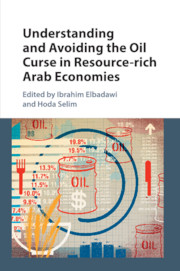Book contents
- Understanding and Avoiding the Oil Curse in Resource-rich Arab Economies
- Understanding and Avoiding the Oil Curse in Resource-rich Arab Economies
- Copyright page
- Contents
- Figures
- Tables
- Contributors
- Foreword
- Acknowledgments
- 1 Overview of Context, Issues and Summary
- 2 The Global Impact of the Systemic Economies and MENA Business Cycles1
- 3 Real Exchange Rates and Export Performance in Oil-dependent Arab Economies*
- 4 Dutch Disease in the Services Sector
- 5 The Political Economy of Public Sector Employment in Resource-dependent Countries1
- 6 The Oil Curse and Labor Markets
- 7 Resource Rents, Political Institutions and Economic Growth*
- 8 Fiscal Institutions in Resource-rich Economies
- 9 Savings and Investment Decisions from Natural Resource Revenues
- 10 Labor Market Heterogeneity and Optimal Exchange Rate Regimes in Resource-rich Arab Countries
- 11 The Institutional Curse of Natural Resources in the Arab World1
- 12 Has the UAE Escaped the Oil Curse?
- 13 Understanding and Avoiding the Oil Curse in Sudan
- Index
- References
6 - The Oil Curse and Labor Markets
The Case of Saudi Arabia
Published online by Cambridge University Press: 05 July 2016
- Understanding and Avoiding the Oil Curse in Resource-rich Arab Economies
- Understanding and Avoiding the Oil Curse in Resource-rich Arab Economies
- Copyright page
- Contents
- Figures
- Tables
- Contributors
- Foreword
- Acknowledgments
- 1 Overview of Context, Issues and Summary
- 2 The Global Impact of the Systemic Economies and MENA Business Cycles1
- 3 Real Exchange Rates and Export Performance in Oil-dependent Arab Economies*
- 4 Dutch Disease in the Services Sector
- 5 The Political Economy of Public Sector Employment in Resource-dependent Countries1
- 6 The Oil Curse and Labor Markets
- 7 Resource Rents, Political Institutions and Economic Growth*
- 8 Fiscal Institutions in Resource-rich Economies
- 9 Savings and Investment Decisions from Natural Resource Revenues
- 10 Labor Market Heterogeneity and Optimal Exchange Rate Regimes in Resource-rich Arab Countries
- 11 The Institutional Curse of Natural Resources in the Arab World1
- 12 Has the UAE Escaped the Oil Curse?
- 13 Understanding and Avoiding the Oil Curse in Sudan
- Index
- References
Summary
Oil revenues enable the government to afford generous wages and expansive employment policies in Saudi Arabia. The availability of low-cost foreign labor combined with a rapidly growing working age population result in a large disparity between public and private sector salaries. This segmentation skews Saudi worker preferences for public sector employment and increases their reservation wages for private sector employment, resulting in high unemployment. Government initiatives such as those entailed by the 2011 royal decrees aiming at increasing public sector employment and compensations would further exacerbate unemployment in the long run. The main manifestation of the oil curse in Saudi Arabia is thus through labor market segmentation and the persistently high unemployment rate.
- Type
- Chapter
- Information
- Publisher: Cambridge University PressPrint publication year: 2016
References
- 4
- Cited by



